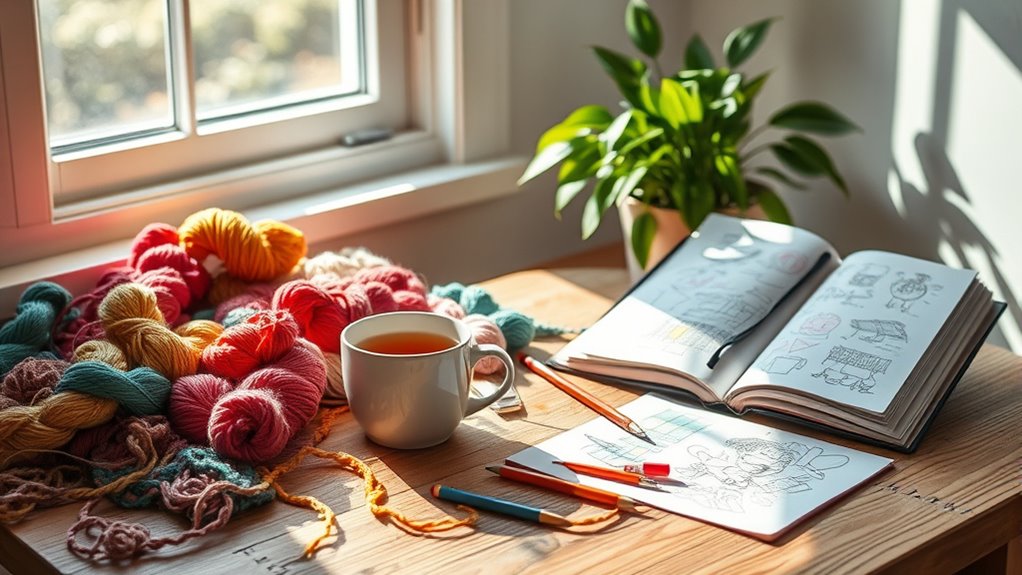Engaging in hobbies is essential for your mental health because it sparks creativity, helps you manage stress, and boosts your mood. When you participate in activities like painting, writing, or gardening, you can process emotions and experience a calming effect. Connecting with others through group hobbies can reduce feelings of loneliness and strengthen your emotional resilience. Keep exploring, and you’ll discover even more ways hobbies can support your well-being and bring balance to your life.
Key Takeaways
- Engaging in hobbies like art or writing fosters emotional expression and mental restoration.
- Creative activities boost mood and reduce stress by shifting focus away from worries.
- Participating in group hobbies enhances social connections, reducing loneliness and supporting emotional well-being.
- Combining creativity with social interaction strengthens relationships and promotes a sense of community.
- Incorporating hobbies into daily routines improves resilience, positivity, and overall mental health.

Have you ever wondered how simple activities can boost your mental well-being? Engaging in hobbies isn’t just about passing the time; it’s a powerful way to improve your mood, reduce stress, and build resilience. One of the key ways hobbies do this is through creative expression. When you pick up a paintbrush, write a poem, or try your hand at cooking a new recipe, you’re tapping into your imagination and emotions. Creative expression allows you to process feelings, express yourself authentically, and gain a sense of accomplishment. It shifts your focus away from daily worries and into a flow state where you’re fully immersed in the activity. This mental escape can be incredibly restorative, helping you feel more balanced and centered.
Engaging in hobbies through creative expression boosts mood, reduces stress, and fosters a sense of accomplishment and balance.
But engaging in hobbies also fosters social connection, which is essential for mental health. When you join a club, attend a class, or even share your progress with friends, you’re building relationships that provide support, encouragement, and a sense of belonging. Social connection combats feelings of loneliness and isolation, which are often linked to depression and anxiety. Participating in group activities related to your hobbies creates opportunities to meet like-minded people, share experiences, and learn from others. These interactions boost your mood and reinforce your self-esteem. Even if you prefer solitary hobbies, finding online communities or local meetups can help you stay connected and motivated.
Moreover, hobbies that combine creative expression and social connection can be especially beneficial. For example, joining a choir, a dance class, or a crafting group not only allows you to express yourself artistically but also helps you forge meaningful bonds. When you create something alongside others, it fosters teamwork and camaraderie, which further enhances your mental well-being. These shared experiences can diminish feelings of stress and anxiety because they remind you that you’re not alone in your journey. Additionally, engaging in activities such as vetting for safety and effectiveness ensures that your chosen hobbies contribute positively to your mental health without unintended risks.
Incorporating hobbies into your routine doesn’t require a lot of time or resources. Just a few minutes each day or week devoted to creative activities can make a noticeable difference. As you nurture your passions, you’ll find that your mental health improves—you’re more resilient against daily stressors, and your overall outlook becomes more positive. So, whether it’s painting, writing, gardening, or joining a discussion group, remember that hobbies aren’t just leisure; they’re essential tools for cultivating a healthier, happier mind.
Frequently Asked Questions
How Quickly Can Hobbies Improve Mental Health?
You might notice mental health improvements from hobbies quite quickly, sometimes within days or weeks. The age of hobbyists doesn’t matter—anyone can benefit. Engaging in diverse hobbies keeps your mind active and reduces stress. Regular participation boosts mood and resilience. So, by exploring different interests, you can experience positive changes fast, making hobbies a powerful tool for your mental well-being.
Are Some Hobbies More Effective Than Others for Stress Relief?
Did you know that engaging in creative hobbies can reduce stress by up to 75%? Some hobbies are more effective than others for stress relief; for example, creative hobbies like painting or playing music stimulate your brain and foster relaxation. Social hobbies, such as team sports or group classes, also boost mood through connection. Both types can considerably lower stress, so choosing activities that match your interests maximizes their calming benefits.
Can Hobbies Help With Severe Mental Health Disorders?
Hobbies can definitely help with severe mental health disorders. Engaging in activities like art therapy and musical engagement provides a creative outlet, reduces feelings of isolation, and promotes emotional expression. While they shouldn’t replace professional treatment, these hobbies can complement therapy, improve mood, and foster a sense of accomplishment. By dedicating time to artistic or musical pursuits, you may find additional relief and support your mental health journey.
How to Balance Hobbies With a Busy Schedule?
Oh, sure, fitting hobbies into a busy schedule is as easy as juggling flaming torches while riding a unicycle. You’ll want to master time management by carving out small moments for yourself, even if it’s just 10 minutes. Prioritizing leisure helps you recharge, so don’t let work or chores steal all your time. Remember, your mental health benefits when you make space for hobbies—so, get creative and schedule it in!
Do Hobbies Influence Long-Term Mental Health Stability?
Hobbies can profoundly influence your long-term mental health stability by fostering social connection and boosting cognitive engagement. When you engage in activities you enjoy, you build relationships and develop skills that help manage stress and prevent burnout. Over time, these positive habits strengthen your resilience, making it easier to handle life’s challenges. So, maintaining hobbies isn’t just fun; it’s a crucial part of sustaining mental health over the years.
Conclusion
Don’t let doubts hold you back—hobbies are a powerful way to boost your mental health. Even if you think you’re too busy or not talented enough, carving out time for activities you enjoy can reduce stress and increase happiness. Remember, it’s not about perfection, but about taking small steps to prioritize yourself. So go ahead, pick up that hobby you’ve been curious about, and start experiencing the positive impact today. Your mental well-being will thank you.









